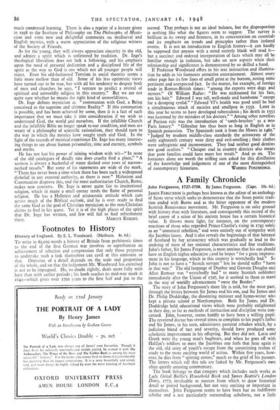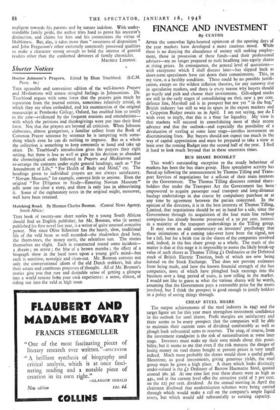A Family Chronicle
John Fergusson, 1727-1750. By James Fergusson. (Cape. 10s. 6d.)
Jamas FERGUSSON is perhaps best known as the editor of an anthology of Scots verse which seeks to demonstrate that the Scots poetic tradi- tion ended with Burns and as the bitter opponent of the modern Scottish Renaissance movement. Mr. Fergusson is on safer ground with history than with literature, and consequently this record of the brief career of a scion of his ancient house has a certain historical value. It throws more light, for instance, on the contemporary reactions of those who regarded Prince Charlie's rising in 1745 solely as an " unnatural rebellion," and were entirely out of sympathy with the Jacobite 'cause. And it also reveals the beginnings of that betrayal of Scotland by her aristocracy which was gradually to lead to the undoing of most of her national characteristics and fine traditions. John's father, Sir James Fergusson, is most anxious that his son should have an English higher education; he hopes " for a great improve- ment in his language, which in tis country is wretchedly bad." So John is not to have a " Scotch servant " lest he should suffer " harm in that way." The old language of Dunbar and Gawain Douglas and Allan Ramsay was " wretchedly bad " to many Scottish noblemen immediately after the Union of 1707, for it seemed to them to stand in the way of worldly advancement " owre the Border."
The story of John Fergusson's short life is told, for the most part, through the letters between Sir James and his son, and Sir James and Dr. Philip Doddridge, the dissenting minister and hymn-writer who kept a private school at Northampton. Both Sir James and Dr. Doddridge held educational views which were probably enlightened in their day, so far as methods of instruction and discipline were Con- cerned. John, however, seems hardly to have been a willing pupil. The reverend doctor has several times to complain to his pupil's father and Sir James, in his turn, administers parental rebukes which, by a judicious blend of tact and severity, should have produced some scholastic improvement in his offspring. But they did not. Latin and Greek were the young man's bugbears, and when he goes off with Halifax's soldiers to meet the Jacobites one feels that here again is the old, old story of youth's escape from the constricting realms of study to the more exciting world of action. Within five years, how- ever, he dies from " spitting stones," much to the grief of his parents. The letters which tell this tale are linked by Mr. Fergusson's own often quietly amusing-commentary.
The book belongs to that category which includes such worki as Lady Grizel Baillie's Household Book and lames Beattie's London Diary, 1773, invaluable as sources from which to draw historical detail or period background, but not very exciting or important in themselves. John Fergusson seems to have been but an indifferent scholar and a not particularly outstanding subaltern, not a little
negligent towards his parents and by nature indolent. With under- standable family pride, the author tries hard to prove his ancestor's distinction, and claims for him and his connections the virtue of likableness. But, alas, it takes more than " sweetness of disposition " and John Fergusson's other extremely commonly possessed qualities to make a character strong enough to hold the interest of general readers other than the confirmed devotees of family chronicles.
MAURICE LINDSAY.



































 Previous page
Previous page